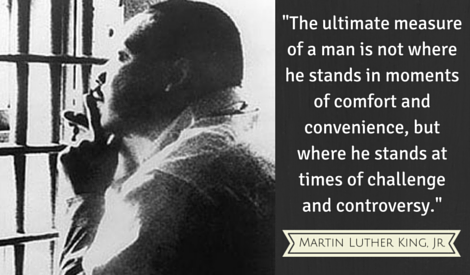Reading the Letter From Birmingham Jail was the beginning of my philosophical studies.
Written by Martin Luther King, Jr. in 1963, this letter was the first rational and ethical defense I had read of the imprisoned man.
I was eighteen years old, in plenty of trouble with the law, and in between punishments for crimes that I did not think were wrong.
MLK provided an ethical context for the imprisoned man in an unjust society, proving to me that a man in prison was not merely a villain. He showed me that heroes could find themselves in jail, and how to conduct yourself if that should happen.
Having an entire judicial system tell you that you are wrong and deserving of punishment is incredibly damaging to one’s psyche and sense of self worth. This letter gave me a moral framework around which I could build the rest of my life, and for that I will forever be grateful.
I went on to study the ethics and philosophies debated by the scholars of history. The focus of my years-long inquiry was the Ancient Greeks, who paid more attention to Arete, or The Good, than anyone else I found; because they were honestly befuddled about what, precisely, Arete really was, they had an honesty to their inquiry that let the reader draw their own conclusions.
Reading classical texts in their native tongue gave me great opportunity to ponder what is right, what is wrong, and how to tell the difference.
The man who set me on that path was Martin Luther King, Jr.
Today I pay tribute to him, for making me into the man that I am today. The quality of my character is owed to the example that he set, an example that anyone can follow.






This is a nice tribute.
Thanks for sharing your tribute to Dr. Martin Luther King. Unfortunately, justice and morality are not always the same thing. Heroes like Dr. MLK help us tune into the real truth.
I agree with both of the other commenters here… Wonderful tribute.
I’ve always believed in taking a person’s behavior and fortitude in moments of great turmoil as an accurate gauge of their true character. Dr. Martin Luther King Jr absolutely personified this! He is truly a hero.